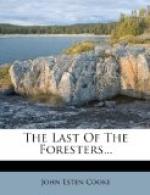“How pretty it is,” she said, gazing with pensive pleasure on the clouds; “and the old grove here is so still.”
“Yes,” Verty said, “I like the old grove very much. Do you see that locust? It was just at the foot of it, that we found the hare’s form, when Dick mowed the grass. You recollect?”
“Oh, yes,” Redbud replied; “and I remember what dear little creatures they were—not bigger than an apple, and with such frightened eyes. We put them back, you know, Verty—that is, I made you,” she added, laughing.
Verty laughed too.
“They were funny little creatures,” he said; “and they would have died—you know we never could have got the right things for them to eat—yes! there, in the long grass! How Molly Cotton jumped away.”
They walked on.
“Here, by the filbert bush, we used to bury the apples to get mellow,” Verty said; “nice, yellow, soft things they were, when we dug them up, with a smell of the earth about ’em! They were not like the June apples we used to get in the garden, where they dropped among the corn—their striped, red sides all covered with dust!”
“I liked the June apples the best,” Redbud said, “but I think October is finer than June.”
“Oh, yes. Redbud, I am going to get some filberts—will you have some?”
“If you please.”
So Verty went to the bushes, and brought his hat full of them, and cracked them on a stone—the sun lighting up his long, tangled curls, and making brighter his bright smile.
Redbud stooped down, and gathered the kernels as they jumped from the shell, laughing and happy.
They had returned to their childhood again—bright and tender childhood, which dowers our after life with so many tender, mournful, happy memorials;—whose breezes fan our weary brows so often as we go on over the thorny path, once a path of flowers. They were once more children, and they wandered thus through the beautiful forest, collecting their memories, laughing here, sighing there—and giving an association or a word to every feature of the little landscape.
“How many things I remember,” Verty said, thoughtfully, and smiling; “there, where Milo, the good dog, was buried, and a shot fired over him—there, where we treed the squirrel—and over yonder, by the run, which I used to think flowed by from fairy land—I remember so many things!”
“Yes—I do too,” replied the girl, thoughtfully, bending her head.
“How singular it is that an Indian boy like me should have been brought up here,” Verty said, buried in thought; “I think my life is stranger than what they call a romance.”
Redbud made no reply.
“Ma mere would never tell me anything about myself,” the young man went on, wistfully, “and I can’t know anything except from her. I must be a Dacotah or a Delaware.”
Redbud remained thoughtful for some moments, then raising her head, said:




